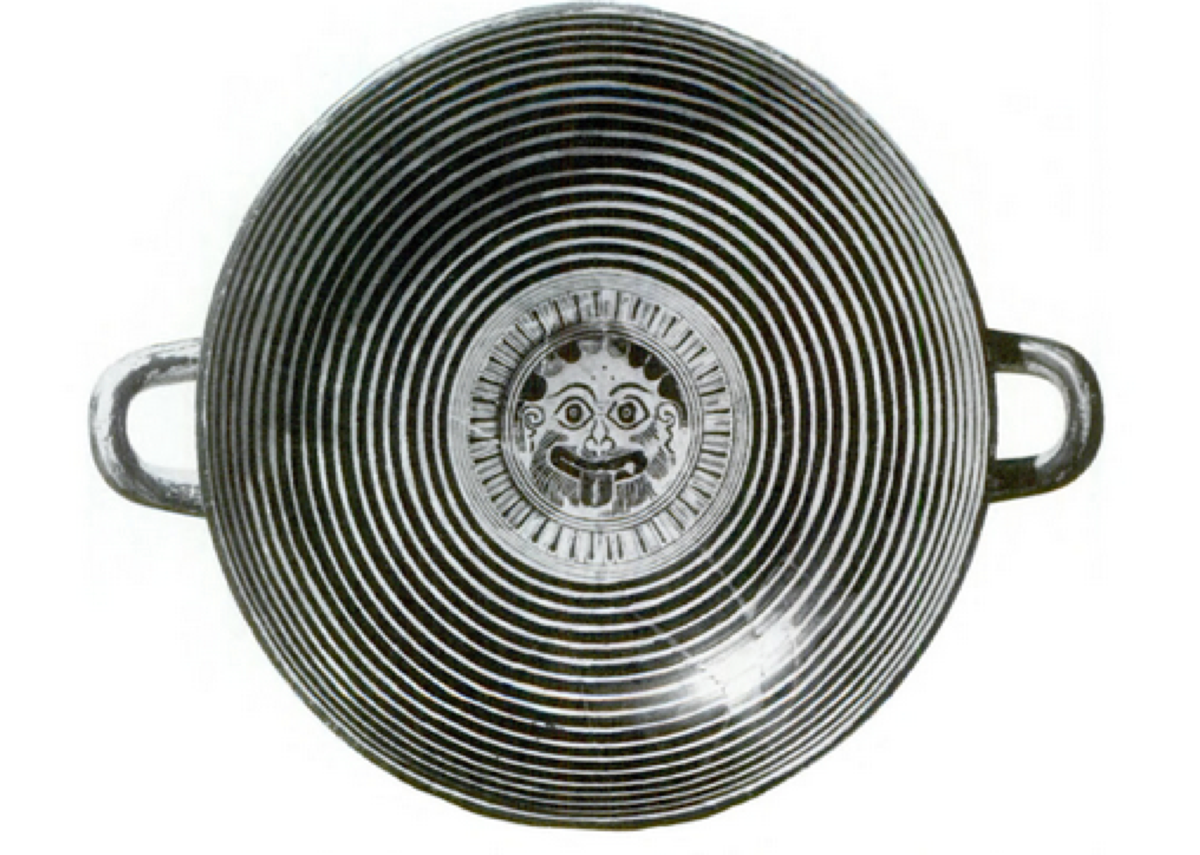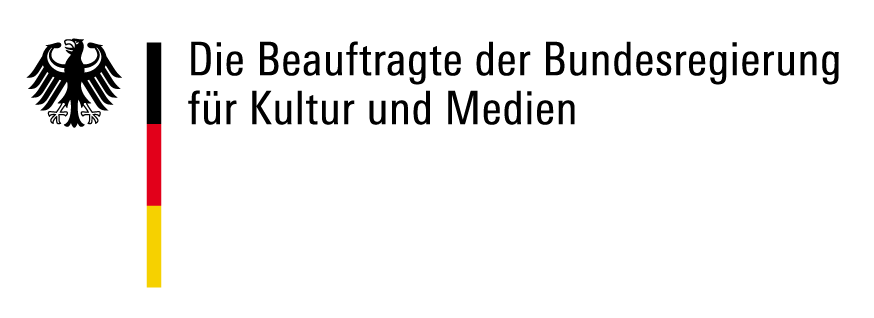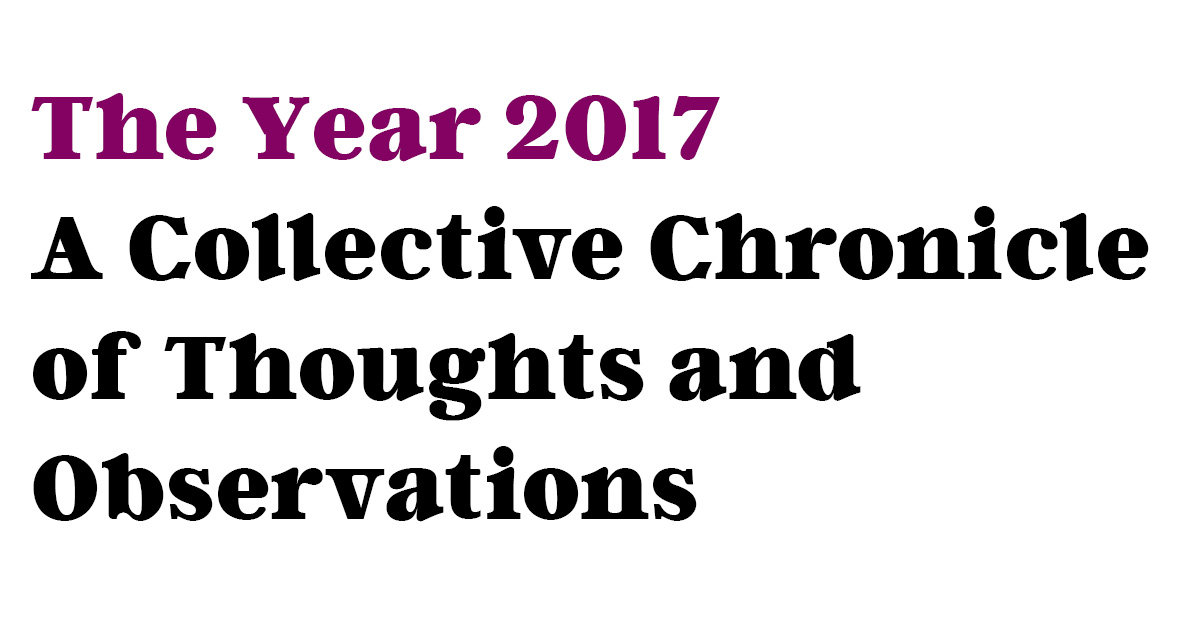FFT Düsseldorf
The Year 2017
A Collective Chronicle of Thoughts and Observations
Welcome to what is going to be a collective chronicle of the year 2017! This journal will follow the general change that we experience in our daily lives, in our cities, countries and beyond, in the political discourses and in our reflections on the role of artists and intellectuals. Originating from several talks and discussions with fellow artists and thinkers FFT feels the strong need to share thoughts and feelings about how we witness what is going on in the world. Week after week different writers, artists, thinkers and scientists will take the role of an observer as they contribute to this collective diary.
#29 July, 17th - 23rd
Maria Sideri

Attic black figure signed by nicosthenes as potter ca. 520 B.C. Virginia Museum of Fine Arts, Museum Purchase, The Adolph D. and Wilkins C. Williams Fund; no. 62.1.11: androgynous Gorgon with three pointed forehead marks from the tondo of an eye cup. Emptying the cup means also confronting the petrifying face; losing one’s head, thus, is cleverly equated with being «out of it». David Napier, Foreign Bodies: Performance, Art and Symbolic Anthropology. p.91.
* * *
My first feeling for escape from Greece came in the 90s. When I was still at school, a big part of the Seix-Sou forest which was near my family house, was cut for the construction of a ring road that connected the city of Thessaloniki from the west to the east. The ring road marked the end of an era. The forest was our playground in the wild, for me, my brother and my friends. The moment that the ring road started to be functional, everything changed: no more tree houses, loads of noise, sonic pollution and trash, accidents and dead animals including one of our dogs. The ring road was like a curse in many ways. It was devastating for nature and for our neighbourhood but it also marked an exit to something bigger from what we knew and could see: it brought what was once far, closer.
When the works finished, I used to walk my dog and sit on a wooden platform under the billboards that looked over the ring road. I would watch the cars pass by thinking that one day I would be in one of those cars running away from there. I remember yearning for places that I had not seen and I was eager to discover.
I decided to leave from Greece in 2005 after my studies. After all, I already knew back then that it would be really hard to get a job in my field, and I wanted to be an artist. I was really excited about the new possibilities. With the support of my family and with bursaries, I have continued studying till I started to work. With my European passport, I lived abroad for 12 years: 5 years in Geneva, 5 years in London and a year and a half in Cairo. During last spring, I have decided to come back to Greece after a good family friend passed away and wanted to be closer to my family. Other reasons have contributed to this decision: the censorship and the difficulty to make work in Cairo, Brexit that influenced my decision to not return to London, as well as documenta14.
* * *
Few months backwards this year, while working in Paris, my friend Martha send me the open call for dokumenta 14. I have to admit that I didn’t know much about it and I started doing my research. I was really interested in the historical role of documenta 14 that started as a post-war avant-garde initiative created in Germany with a function to question the system of money and power. I was curious to see how documenta 14 could potentially create a different dialogue between Greece and Germany today. I have decided to send my application. Around mid-February, I got an invitation for an interview. documenta 14 was opening for the first time in Athens under the slogan “Learning from Athens”. The job offered, was to be part of a “chorus” that had the role to guide the audience through the works exhibited in various venues of Athens while providing personal input to the works.
All these years abroad, I have developed this complex feeling of belonging and arriving to Greece. I have been away during the financial crisis. I knew that part of my identity was injected with other influences now and it would be hard to come back. I felt for long time that I have missed something really important but now I know I gained something else: the gaze of a semi-foreign body.
I got my interview through skype with documenta 14 at the end of February while still living in Cairo. Due to many factors, how the interview felt, the terms of the contracts, a feeling of mistrust for the contracting company Big Olive and its relation to dokumenta 14, the little information about the job, as well as leaving my work in Cairo unfinished, I have decided to turn down the offer. I felt I would get involved in something that not only was clearly not providing good working conditions, but that was opening unfortunately a bigger debate between the Europe of Greece and the Europe of Germany. Despite all this, this invitation made me curious to visit documenta 14 and see for myself, through the eye of a semi-foreign anthropologist.
* * *
So, for the last two weeks, I have been in Athens. Last time I was here was three years ago. I am discovering the city again through the experience of documenta 14. The learning or the unlearning process, as Adam Szymczyk, the artistic director, puts it, is part of my own transition here. I witnessed really strong work: the video work of Eva Stefani, of Emeka Ogboh and Lala Rukh at the Odeon, I talked with the fine arts students in ASFA and did a couple of walks with the chorus. I really immersed myself in the work and the different locations with visitors, curators and performers. I sat at a lot of tables with international artists and cultural managers. I read the posters of the anarchists, the open letter signed from the ”Artists Against Evictions”, the thoughts of Varoufakis and discussed the views of Greek artists. And I felt the big contradiction that the whole country is in: the impossible challenge to create a big art event with German prestige, when people have no jobs and are under serious pressure. I noticed the difficulty for the foreigners and cultural tourists to visit the real streets where different things are happening like the major refugee problem. I saw the gap between reality and culture getting bigger. But I also saw a lot of genuinely engaged and politically active people, I witnessed the work of artists from many different countries. My favourite exhibition was in the annexe of the Benaki Museum in the Pireos street that reflected the geographical reach of the museum’s collection. I also met people that worked really hard for documenta 14 to happen and negotiated their working rights as cultural workers. I met again a lot of my migrant friends that decided at this moment to return to Greece and get involved one way or another.
For all the above reasons, I am glad to be back with my semi-foreign identity and transiting into something that I know but also don’t really know here. In any case I think that it is completely absurd to expect from documenta 14 to come and resolve the financial crisis. But of course, the choice is there, if you want to be part of the institutionalised art or not, this is a bigger question to address to all the participants and artists and the question remains: how to continue to get involved with what matters.
* * *
Two weeks ago, I read the letter of resignation of the writer and media theorist and activist, Franko Bifo Berardi to Diem25- which stands for Democracy in Europe Movement 25. It gave me goose bumps. He is refusing to be called a European accusing Europe for the biggest humanitarian crisis that has ever occurred and «denying its historical responsibility for the migration wave that is the result of the wars by two centuries of colonialism». I would like to connect my thoughts of my transition to Greece as a semi-foreign body, documenta 14 and Europe.
After having lived in Cairo, I feel really lucky and grateful to have a European passport. The non-choice to leave one’s country is terrible. My European passport gave me this opportunity to study and live abroad. But this European identity is constantly shifting. In Egypt, I am a privileged European, in England I was only Greek, being looked at sometimes with mistrust and empathy - in Switzerland, the private foundation that offered me a bursary for studying didn’t even know that Greece was in the EU – that was in 2006!
My experience coming back to Greece to witness documenta 14 shifts between knowing and not knowing where and who I am. Like Paul Preciado described in his case literally and metaphorically, a type of transition. Like the ring road behind my house, documenta has a double function. The ring road was destructive as it reflected the means and ways in which things happen here and out of here and corruption has a lot of faces, no regulations were respected and some damage made. Similarly, documenta 14 came to Greece to apply policies that cannot be respected in Greece neither implemented – here it would be interesting to consult someone who studied the contracts closely - but it did create ephemeral labour and an exchange outside of national identity and borders. As a foreign body itself, a ring road that shortens and bridges a political and cultural dialogue, documenta 14 functioned as a mirror for Greece and for itself and for Europe. But the real dialogue is yet to happen. Adam Szymczyk said: «We must assume responsibility and act as political subjects instead of leaving it to the elected representatives». True. Reminds me of Kornelius Kastoriadis in an interview to Chris Marker that examines the end of the value democracy, when representative democracy starts. I want to agree but add that those who represent us today are not the ones we see. The dialogue needs to open up and question the established identities. During the last 10 years, in Europe, I was regarded more and more as a privileged person by the Greeks, for having left the country before the crisis, and with empathy from the Europeans. I left in order to enrich my experiences and challenge who I am. I am now discovering something superficial. Europe is a contradiction and its countries cannot work together, their interests clash and collide but mainly Europe is not learning from its mistakes. For example, I can’t say that I have experienced or learned from the economic depression and the austerity measures in my everyday life and I won’t pretend that I do understand it because I am Greek. I only had echoes from my family and friends as I remain a semi-foreign body here, something that I cherish. This cross semi-foreign identity is an accomplishment for many reasons that I cannot unfold here briefly. But I will give an example that can illustrate better my thoughts and conclude:
In my artistic practice influenced from my studies in anthropology and history of religion, I investigate the idea of the foreign body. I discovered the book of David Napier, Foreign Bodies- Performance, Art and symbolic Anthropology. This book explores some of the ways in which the foreign becomes part of a cultural identity rather that something outside of it. Referring to the foundation myth of Perseus, among other examples, he demonstrates how myth and concepts of the foreign become relevant as part of a culture, how the mirror effect with an «other» forms one’s identity individually and culturally.
The myth of Perseus and its attention to the foreign makes the idea of the foreign the most important focus of the myth. Perseus the ruler or tyrant and the founder of Mycenae,·after accidentally having killed his grandfather fulfils the prophecy that gave rise to the hero’s adventures. Perseus beheaded the Gorgon Medusa and saved Andromeda. Because the gaze of the Gorgon Medusa turned all of who looked at her into stone, Perseus guided himself by her reflection in a shield given him by Athena and beheaded the Medusa as she slept. The Medusa, or Gorgon functions as an “apotropaio” (apotropaic = magical power to protect from harm) similar to the eyes on the boat prows. The mirror effect of the Gorgon that represents the foreign, enables one to become another while staying oneself. It’s a mirror where one sees oneself seeing oneself.
Without entering in details, I provide the example of this particular myth as a mirror of the foreign that is also a boundary marker of who and what a culture could be. documenta 14 has created these conditions somehow, of a mirroring. Cultural identity is understood to be a function of some type of cross cultural symbolic exchange, but it’s not just that. This exchange has happened with documenta 14: the various works of living and dead artists from all over the world, the bridging with Kassel, the cultural tourism, the ephemeral labour that it has created, but that is not enough for me. The very question is how to look while also seeing oneself, to expand one’s identity through the eyes and the contact with another, to apply a productive criticism and take radical positions. It’s not o.k. to accept to work for the institutions while accusing them and it’s not o.k. to not work and withdraw. And here to use Napier owns words: «When Perseus slays the monstrous Medusa, he looks not only to the ends of the then known-world, when Perseus looks in the mirror of Athena’s shield, we must realize that he is not only looking into the magical land of the foreign, but that in so doing he is also looking directly at himself». D. Napier Foreign bodies: Performance, Art and Symbolic Anthropology p. 111).
* * *
Maria Sideri (1982, Greece) is a multidisciplinary artist and independent researcher working between performance, sound and choreography. Her practice is influenced from anthropology and is investigating the idea of the foreign body, in order to create a dialogue between what is performed and its embodiment in the cultural context in which it occurs. She is currently based in Greece.
More information:
http://mariasideri.tumblr.com/
http://www.mariasideri.co/
Napier, D., Foreign Bodies: Performance, Art and Symbolic Anthropology, University of California Press, 1996.
http://www.thewhitereview.org/art/learning-from-athens/
https://frieze.com/article/documenta-14-benaki-museum
http://moussemagazine.it/paul-b-preciado-georgia-sagri-exposed-to-the-unknown-documenta-14-2017/
#1 January 1st - 8th Jacob Wren
#2 January 9th - 15th Toshiki Okada – japanese version
#3 January 16th - 22nd Nicoleta Esinencu – romanian version
#4 January 20th - 30th Alexander Karschnia & Noah Fischer
#5 January 30th - February 6th Ariel Efraim Ashbel
#6 February 6th - 12th Laila Soliman
#7 February 13th - 19th Frank Heuel – german version
#9 February 26th - March 5th Gina Moxley
#10 March 6th - 12th Geoffroy de Lagasnerie – version française
#11 March 13th - 19th Agnieszka Jakimiak
#12 March 20th - 26th Yana Thönnes
#13 March 30th - April 2nd Geert Lovink
#14 April 3rd - 9th Monika Klengel – german version
#15 April 10th - 16th Iggy Lond Malmborg
#16 April 17th - 23rd Verena Meis – german version
#17 April 24th - 30th Jeton Neziraj
#20 May 15th - 21st Bojan Jablanovec
#21 May 22nd - 28th Veit Sprenger – german version
#22 May 29th - June 4th Segun Adefila
#23 June 5th - 11th Agata Siniarska
#25 June 19th - 25th Friederike Kretzen – german version
#26 June 26th - July 2nd Sahar Rahimi
#27 July 3rd - 9th Laura Naumann – german version
#28 July 10th - 16th Tom Mustroph – german version
#29 July 17th - 23rd Maria Sideri
#30 July 24th - 30th Joachim Brodin
#33 August 14th - 20th Amado Alfadni
#35 August 28th - September 3rd Katja Grawinkel-Claassen – german version
#38 September 18th - 24th Marcus Steinweg
#43 October 23rd - 29th Jeannette Mohr
#44 May/December Etel Adnan
#45 December 24th - 31st Bini Adamczak
#21 May 22nd - 28th Veit Sprenger – german version
10.6. #future politics No3 Not about us Without us FFT Juta
Geoffroy de Lagasnerie Die Kunst der Revolte
21.1. #future politics No1 Speak TRUTH to POWER FFT Juta
Mark Fisher
We are deeply saddened by the devastating news that Mark Fisher died on January 13th. He first visited the FFT in 2014 with his lecture „The Privatisation of Stress“ about how neoliberalism deliberately cultivated collective depression. Later in the year he returned with a video-lecture about „Reoccupying the Mainstream" in the frame of the symposium „Sichtungen III“ in which he talks about how to overcome the ideology of capitalist realism and start thinking about a new positive political project: „If we want to combat capitalist realism then we need to be able to articulate, to project an alternative realism.“ We were talking about further collaboration with him last year but it did not work out because Mark wasn’t well. His books „Capitalist Realism“ and „The Ghosts of my Life. Writings on Depression, Hauntology and Lost Future“ will continue to be a very important inspiration for our work.
Podiumsgespräch im Rahmen der Veranstaltung "Die Ästhetik des Widerstands - Zum 100. Geburtstag von Peter Weiss"
A Collective Chronicle of Thoughts and Observations ist ein Projekt im Rahmen des Bündnisses internationaler Produktionshäuser, gefördert von der Beauftragten der Bundesregierung für Kultur und Medien.

